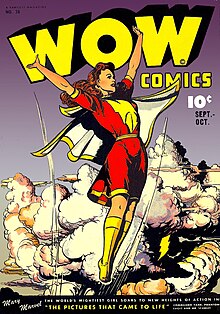Superhero comics
| Superhero comics | |
|---|---|

Cover of Wow Comics 38 (Sept./Oct. 1941).
|
|
| This topic covers comics that fall under the Superhero genre. | |
| Publishers |
DC Comics Marvel Comics Image Comics Valiant Comics Charlton Comics |
| Publications |
Superman Batman The Amazing Spider-Man Watchmen Astro City |
| Creators |
Jack Kirby Stan Lee Dennis O'Neil Alan Moore Steve Ditko |
| Series | "The Death of Superman" "Gods and Mortals" "Days of Future Past" "The Night Gwen Stacy Died" "Snowbirds Don't Fly" |
| Related articles | |
|
Comic book death Magical girl Superpower Tokusatsu Women in Refrigerators |
|
Superhero comics are the most common genre of American comic books. The genre rose to prominence in the 1930s and 1940s and has remained the dominant form of comic book in North America since the 1960s. Superhero comics feature stories about superheroes and the universes these characters inhabit.
Beginning with the introduction of Superman in 1938 in Action Comics #1 — an anthology of adventure features — comic books devoted to superheroes (heroic people with extraordinary or superhuman abilities and skills, or god-like powers and attributes) ballooned into a widespread genre, coincident with the beginnings of World War II and the end of the Great Depression.
In comics format, superpowered and costumed heroes like Popeye and The Phantom had appeared in newspaper comic strips for several years prior to Superman. The masked detective The Clock first appeared in the comic book Funny Pages #6 (Nov. 1936).
In the Great Depression and World War II era the first Superhero Comics appeared, the most popular being Superman, Batman, Captain Marvel, Wonder Woman and Captain America.
After World War II superhero comic books gradually declined in popularity, their sales hindered in part by the publication of Seduction of the Innocent and the investigations of The Senate Subcommittee hearings on juvenile delinquency.
Beginning in the 1950s, DC began publishing revised versions of their 1940s superhero characters such as The Flash and Green Lantern with more of a science fiction focus. Marvel Comics followed suit in the 1960s, introducing characters such as Spider-Man, the Fantastic Four, the Hulk, Thor, the X-Men and Iron Man who featured more complex personalities which had more dramatic potential.
...
Wikipedia
